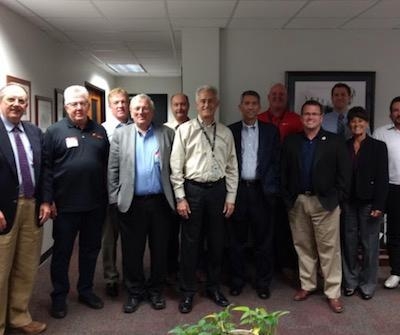Meeting With FSANA Held To Focus On Delays In Testing Across The U.S.
While much of the aviation industry was at EAA Airventure 2018, a FSANA lead industry task force went to Oklahoma City to meet with senior FAA staff from Washington, DC and Oklahoma City. The meeting scope was focused on the airman testing delays across the United States.

The FAA at the highest levels is committed to making major changes in policy guidance to provide relief of scheduling backlogs for airman practical tests around the country. FSANA is pleased to report that changes are coming in September 2018.
"On behalf of our members, the flight training industry and the many new airman candidates in the pilot pipeline, we are deeply appreciative to FAA leadership and staff for their dedication to helping to resolve critical pilot pipeline issues with respect to airman practical testing," said Bob Rockmaker, FSANA president and CEO.
FAA leaders who have been supportive include Ali Bahrami, Associate Administrator for Aviation Safety, John Duncan, Executive Director of Flight Standard Services, James Viola, Deputy Director of Aviation Safety, GA Safety Assurance, Van Kerns, Deputy Director of Aviation Safety, GA Safety Standards, Larry West, Division Manager, Regulatory Support Division, Jay Kitchens, Designee Program Branch Manager along with the support team from FAA that helped make the changes required to move forward
Policy and/or process changes include:
- Geographic boundaries for DPE's will be fully eliminated.
- CFI practical test scheduling will no longer be done by the FSDO. Airman applicants will schedule directly with DPE's who are authorized to conduct initial CFI practical tests.
- DPE oversight rides which have been triggered by 50 activities will be replaced by a risk based model.
- The National Examiner Board will be eliminated and a new National Appointment Process will be created.
- Airman practical testing for balloon, glider, sea plane and other specialty categories will be enhanced so that airman applicants do not have to wait 4-16 weeks for a test.
- Organization Designation Authorization (ODA) Beta tests will be conducted in one each Part 141, 142, 145 and 147 organizations over the next 12-18 months.
- The new Designee Management System (DMS) will start to be rolled out this fall with a April 2019 completion date.
- Organization Designation Authorization (ODA) Beta test will be conducted for aircraft inspection organizations over the next 12-18 months.
- The FAA will begin a re-write of FAR Part 183 which states what the FAA can delegate.
- Develop a safety assurance system.
- FAA will review all delegation programs to insure that maximum utilization is being effected with the system.
- FSANA Confident Changes will have Immediate and Future Positive Effects on Airman Practical Test Scheduling Shortages
The FAA committed to immediately address hot button geographic areas where there are severe issues with airman test scheduling. FSANA expects places like Arizona, California, Colorado, Florida, Georgia,Texas, the Carolina's and areas in the Northeast to be immediate targets for additional DPE support.
As these changes are made with industry and FAA collaboration, FSANA is confident that safety will be ensured while also improving the ability to provide practical tests in a timely manner within the U.S.
Many of the changes will begin within the next 30 days. As this happens, and it becomes effective, FSANA will update the information provided and provide notification.
These changes are the result of dedicated focus on the part of FSANA, the FAA, and industry task force representatives that shows that as the industry and FAA work together, real progress can be made that helps make the business of flight training more efficient and effective within the U.S. aviation system.
(Image provided with FSANA news release)
 ANN's Daily Aero-Term (05.17.24): Very High Frequency
ANN's Daily Aero-Term (05.17.24): Very High Frequency ANN's Daily Aero-Linx (05.17.24)
ANN's Daily Aero-Linx (05.17.24) ANN FAQ: Submit a News Story!
ANN FAQ: Submit a News Story! Classic Aero-TV: ANN Visits Wings Over The Rockies Exploration Of Flight
Classic Aero-TV: ANN Visits Wings Over The Rockies Exploration Of Flight Airborne Affordable Flyers 05.16.24: PRA Runway, Wag-Aero Sold, Young Eagles
Airborne Affordable Flyers 05.16.24: PRA Runway, Wag-Aero Sold, Young Eagles



